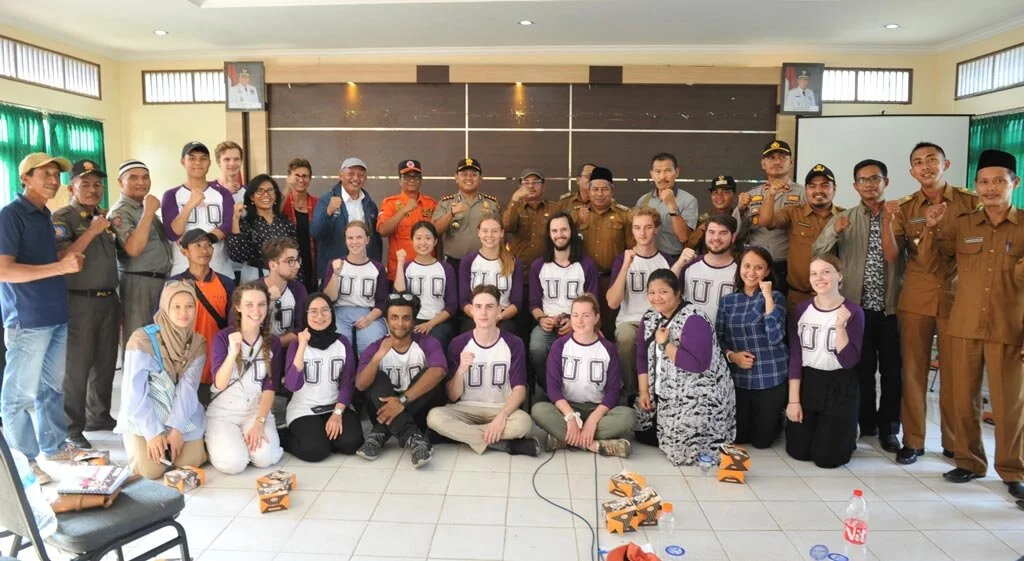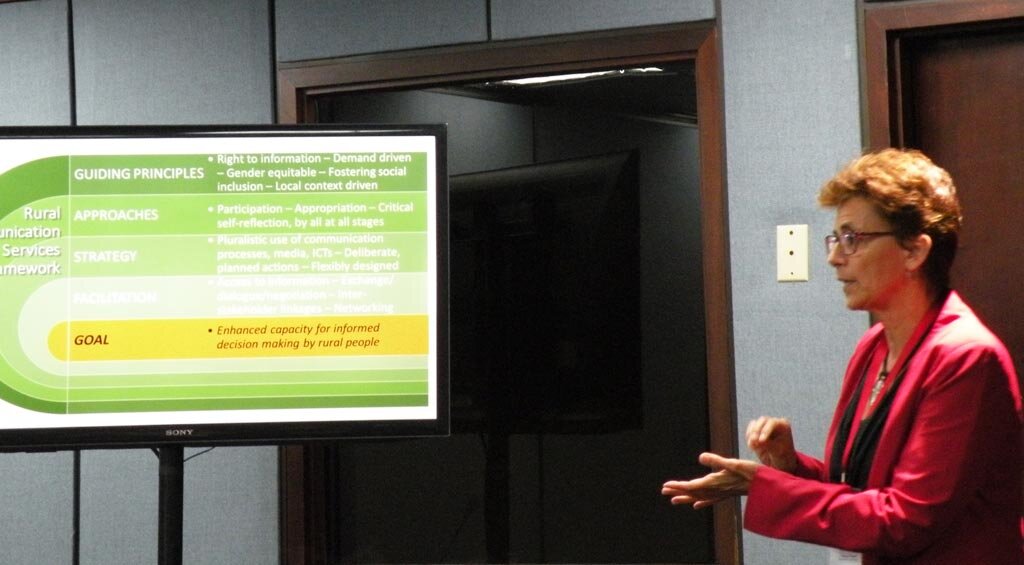Elske van de Fliert on Communication, Participation & Engagement For Social Change
Elske van de Fliert has dedicated the past three decades to understanding and teaching how communication processes facilitate people’s participation in and ownership over change processes.
Most of her work relates to sustainable rural development in the Global South, in particular Southeast Asia, where she lived and worked in research, development and teaching positions for almost 20 years before moving to Australia in 2006.
Elske is currently Director of the Centre for Communication and Social Change, and Associate Professor at the School of Communication and Arts, at The University of Queensland. Coming originally from an ecological sciences background, she obtained a PhD in Communication & Innovation from Wageningen University, The Netherlands. Her work finds application across several disciplinary fields, including agriculture, rural and community development, and energy poverty.
Elske shares her deep experience and trends in the field of communication in both national and international environments, including its power to influence social change through stakeholder participation and sustainable development.
Highlights from the interview (listen to the podcast for full details)
[Tom Allen] - Could you please share a bit about your background and what led to your work in communication for social change?
[Elske van de Fliert] - Well it's a bit of a long and winded story with an unexpected twist halfway. I knew when I was a teenager that I wanted to work in development, but I decided to study biology and became interested in ecological sciences and the connections that it brings in nature and the environment. But, when I did my Masters, I was able to do some research in Sri Lanka with the food and agriculture organisation of the United Nations on a project that looked at integrated pest management, but particularly the human elements and how farmers actually need to learn and implement that. The project asked me to do not just the technical research I thought I would be doing as a biologist, but what they call the agriculture extension.
I started taking courses I was interested in during my studies. That whole field of agriculture extension or advisory services was renamed to Communication and Innovation Studies for Universities in the Netherlands. I got more into the field and then worked after graduating for a couple of years, and my PhD in that field always combined the technical elements with the communication bits, until I suddenly got this email out of the blue from the University of Queensland. They asked if I wanted to apply for a job at the School of Journalism and Communication, and I thought, “what the hell do I do?” because I'm working in development. But, then I realised what we were actually doing is communication for social change. And it was an area that UQ was just developing.
PEATLI-2 team in Tebing Tinggi Barat: involving students in an transdisciplinary learning project with rural communities in Indonesia (around peatland restoration).
by that time I was in Vietnam and I had learned that to actually be a change agent, it’s only the local people who can really make the change, while we can merely contribute through education.
At a university where we get people from the countries where I've worked, I thought, "Hey, that's a great, great thing to do as a next step in my career,” rather than not making any difference myself in those countries. Hopefully I can help make young people from these countries help open the blinds a little bit and make the change they wouldn't see come through.
It's been a great journey, Elske. So now you're Director of the Centre for Communication and Social Change. What sort of projects are you and the team involved in then?
I've been typically still working in agricultural projects and energy poverty over the last couple of years. And most of my work fits in two of the four themes that we work with at the Centre. The first is participation between development communication, which looks at how communication can facilitate participation and engagement of all stakeholders in change processes. The second is communication and interdisciplinary sustainable development, which is really how we strategically design research and development across disciplines to make sense in the real world. It’s really more interpersonal, integral communication and facilitation approaches expressed into other themes that we work on at the Centre. Several of my colleagues including Devon Moore are working with communication advocacy, looking at social movements particularly for media as well as communication technologies and social change. My own work still is particularly involved with Asia at the moment. I work in Indonesia and Timor-Leste, as well as the Philippines. A couple of years ago I also had two big projects in Mongolia. So up to date, very little work in Australia, but in neighbouring countries.
ToF Timor Leste: Training of field facilitators (Ministry of Agriculture) in Timor Leste.
How have you seen participatory research and communication methods evolve then over the last five or so years, particularly when we're talking about this area of sustainable rural development?
It's not so much even the last five years… if I look at how these approaches are integrated in research and development initiatives. If I look at trends particularly, they seem to be coming and going. Basically those more participatory approaches in planning and implementation evaluation of development and change projects started in the late 1980s, early 90’s when I was just starting to work in Asia.
Then they petered out because people found it too hard. A lot of the approaches were really well developed, but people wanted to blueprint them and that defeats the whole purpose of using participatory approaches. It's all about being really specific for a particular area.
But then they come up again and so it goes back and forth. Where it has particularly changed over the last five to ten years is in the use of media and information communication technologies, which has a lot of advantages to reach more people and engage more people, through interactivity.
It has also been a huge danger of being more about talking than listening and sharing. Very often you see that donor organisations want to support participation and engagement. They know it's important, but they don't want to buy into the long term processes that are actually required.
They are looking for those silver bullet solutions through information communication technologies, and I've seen very few examples of that really working. That interpersonal capacity building and the hard work on the ground is still important.
IAMCR Cartagena presentation: conference presentation – linking practice to theory.
Where do you feel people can typically improve in communication around social change? Are there any other areas or things you'd like to really emphasise?
I think it really has to be embedded in our education, policies, and funding schemes. At the moment what I see is very much not embedded. As you know, participation is this buzzword, “We need to engage people as a project, and then great projects are being done.” But at the moment, the project stops and the whole facilitation of this process is gone. People move on with the next project that have.
Where I see the issues are is that it's not embedded in education. For instance, we barely teach our students different kinds of research methodologies than what they did 50 years ago. It's still very much about how to find the evidence, whereas the evidence is very fluid. If we look at really what's happening in society, it's about people's perceptions. It's about how people make sense of the world around them. It's about integrating perspectives.
Of course, we learn at university or even high school to be specialists, but we have to understand how specialisations fit into the larger picture of the lives of people. Learning to make sense of your expertise in the larger world I think is freedom.
The results and the policies are still very sectorial or disciplinary. There is this kind of fluff that it needs to be participating. But it's very superficial and it doesn't really go deep into what does it really mean to work as a society with people from different perspectives. Different disciplines actually change and institutionalise within organisations, our communities and policies.
You'll be sharing some of these insights at the Newkind Conference, which will be held at the end of January down in Marion Bay. So what are you most looking forward to about the five days down in Newkind Conference Elske?
I've never attended a Newkind Conference, just because it never worked out with timing, even though the organisers have been trying to make us come of course. What I’m really looking forward to is to actually engage with very different [people], which I think are going to be quite different from who I usually engage with being at a university and particularly working overseas.
PEATLI-1 Kalteng farmers LSP: facilitating farmers in Indonesia to develop a vision for the future using LEGO Serious Play.
I've really liked to learn a lot from people who have been doing particular things in Australia with social movements and social initiatives to see what approaches they are using, what experiences they are having and to try and reflect on my own experiences, which we've done with students projects like for instance youth communities here in Brisbane or with Vietnamese farmers in Queensland.
I find a lot of these principles are transferable, but I would really love to learn from some people who work in other networks, then where I've been the last ten, fifteen years and see what they see as the strengths and the barriers.
There should be a great group of people down there.
Are there any particular social enterprises, organisations or initiatives that you believe are doing a really great job at tackling some really deep rooted social, cultural and environmental problems Elske?
I've always gravitated towards NGO networks even though I was working with the United Nations myself and more established research institutes. But I've always collaborated with those grassroots organisations. The ones that are really effective are the ones who have a long-term vision or work long-term in certain communities or with certain groups to really get that change embedded in everything they do and build that capacity, rather than those who just do quick projects and tick off boxes, based on the indicators that the institution declared. I think it's more about the principle of taking that time, that pace to actually engage with people. Get people to make a difference themselves. Often, it’s a lot more in these grassroots organisations that really are designed to do that, rather than those who are just running full projects.
That makes complete sense. So to finish off then, what books or resources would you recommend to our listeners?
Well, if I can do some shameless self promotion, my colleague Pradip Thomas and I are co-editing a series. It's called “Palgrave Studies in Communication for Social Change”. At the moment there's 18 titles. So Pradip and I wrote the initial book where we try to identify the gaps in the field.
A lot has been written in theory but it was all stagnant. When we started this about five, six years ago, we tried to really take stock and identify gaps and then invite everyone. It could be academics, but also activists and whoever wants to fill those gaps.
The whole series has a very interesting array of topics that are being touched from more methodological to activism, to covering all areas of the world. And I think this is a range of resources that might be useful for people.
Elske, thank you so much for joining us for this very special 200th episode today and for sharing your generous insights and time and we'll look forward to seeing you at Newkind Conference.










